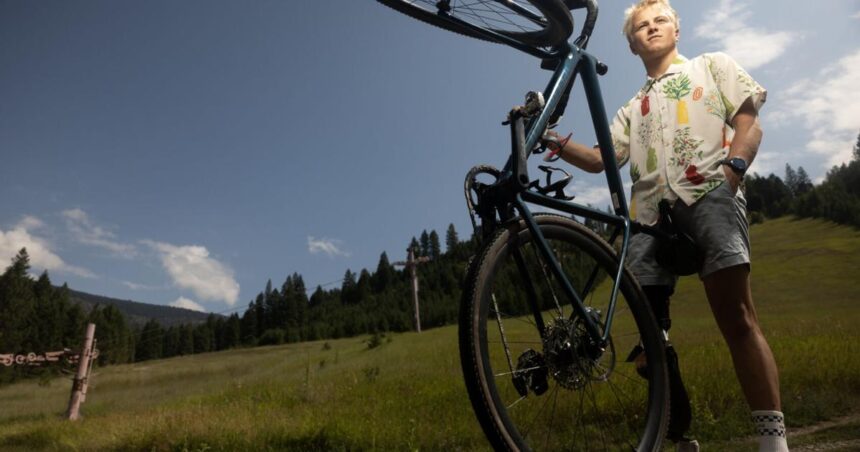Pediatric cancer is often described as an “uphill battle”: the fight to afford treatments and disruptions to life; the fight for funding and research to develop more than the frustratingly few treatments available for kids; the emotional fight to maintain hope; and of course the personal, physical effort to survive the disease itself.
Next month at Marshall Mountain Park near Missoula, the fight for more funding for pediatric cancer research will quite literally be an uphill battle. But then, two hours later, it’ll be a battle back downhill.
Jack Berry poses for a portrait at Marshall Mountain on Friday, Aug. 16, 2024.
The first running of Le Uphill Climb — two bike races in one fundraiser event — is set for Sept. 15, a Sunday. It’s organized by Missoula’s Jack Berry, 16, who took to competitive cycling and Nordic skiing after a multi-year bout with osteosarcoma bone cancer that resulted in the amputation of his right leg.
People are also reading…
The event features a dirt-road hill climb to the top of Marshall Mountain Park at 1 p.m., “to satisfy the roadies,” Berry, a mountain biker and gravel rider, said jokingly. That’s followed by a dual-slalom race at 3 p.m.: Riders compete side-by-side on a downhill course of berms and jumps; winners advance to the next bracketed round. There will also be a raffle or silent auction, a food truck, and music from Missoula cycling-event mainstay DJ Ivanoff.
Unlike the Mullet Classic run by MTB Missoula each year, Le Uphill Climb is not a partner race or a combined-time race, Berry said. Each separate race costs $30, but a rider can enter both for a discounted $45 total fee. Each race has categories for men, women, and junior riders, and men and women para-cyclists. Registration is open at bikesignup.com/Race/MT/Missoula/LeUphillClimb.
All funds raised at Le Uphill Climb (the name, a nod to Le Tour de France) will go to Children’s Oncology Group, a pediatric cancer clinical trials organization supported by the National Cancer Institute. Berry’s younger brother, David, held a talent show fundraiser for the institute in February. Sponsors include The Cycling House; Scratch Labs Sports Nutrition; Pit Viper sunglasses; MTCX Skis, Bikes, and Events; and Grist bread.
“Obviously it’s personal to me with my personal interaction with cancer,” Berry said. “That’s what inspired the event, is how can I give back to the community that supported me for so long, and support the cause in my own way.”
‘It seems like an uphill battle’
Nearly 16,000 children in the U.S. are diagnosed with cancer each year — 43 children a day, or about one nearly every three minutes — according to the Colorado-based Ski Fast Foundation, which supports young people diagnosed with sarcoma cancers.
Only about 4% of cancer research funding in the U.S. each year goes toward developing treatments for childhood cancer, according to the Pediatric Cancer Research Foundation and the Ski Fast Foundation. That’s barely more than $200 million out of the billions spent each year on cancer research.
That mismatch has led to comparatively few new treatments being developed for children who have cancer. According to the Ski Fast Foundation, three new pediatric cancer drugs have been developed in the U.S. since 1980. In that same time, at least 184 new drugs were developed for adults.
“The unfortunate reality is, at the end of the day, the pharmaceutical companies are worried about their bottom line. They see that childhood cancer research is not a good investment because of how much more profit they can make in the adult cancer market,” said Caitlin Sullivan, who lives in Spokane, Washington, and helps run the Ski Fast Foundation with her family. “That being said, cancer is the number-one killer of children by disease. But it’s not equal: 4% of funding does not equate to the number-one killer.

“It seems like an uphill battle at times,” she added.
‘Seeing beyond themselves’
The Ski Fast Foundation was founded by Campbell Sullivan, Caitlin’s younger sister and an aspiring Alpine ski racer in Colorado. Campbell Sullivan was diagnosed with a rare form of sarcoma, a cancer of bone or soft tissue, in 2017, as she began her junior year in high school. She was one of only a couple hundred American children with her particular form of sarcoma.
Dozens of radiation doses, 14 rounds of chemotherapy and a stem-cell transplant sapped her strength and put ski racing on hold. But she switched to coaching when she could, and she began working to support other young people affected by sarcoma, even as it continued to take a toll on her.
Campbell Sullivan traveled to Washington, D.C., to advocate for pediatric cancer research, and she founded the Ski Fast Foundation in 2020. Since then, the nonprofit has awarded almost 60 scholarships across two annual application windows “to help kids get back in the game and do what they love,” Caitlin Sullivan said, whether that’s ski racing or taking singing lessons.
Campbell wasn’t the only young person with cancer who worked to help others in the same circumstance, Caitlin Sullivan said.
“It’s incredibly inspiring, not only Campbell, but others I’ve met who are pushing for cures despite going through treatments themselves,” she said. “They’re seeing beyond themselves.
“I think Campbell realized — she was one of the most positive people I’ve ever known, if not the most positive person I’ve ever known — I think just holding on to hope that they can find a cure,” Caitlin Sullivan said. “Even in the dark days when she had the thoughts that, ‘Hey, I’m not going to make it through this,’ she at least had the thought that she was going to change things for other kids down the road.”
Campbell Sullivan, her sister said, “saw that need to push for more funding” for pediatric cancer. Many on Capitol Hill and in the pharmaceutical industry, however, do not, she said.
“To be honest, having been around my sister for four years going through treatment, and many other children that we’ve become close to going through this, it’s really amazing how many instances we’ve seen where the kids don’t come through, which is tough,” she said, adding that policymakers and drugmakers could help mitigate that by funding more research and treatment development for childhood cancer.





